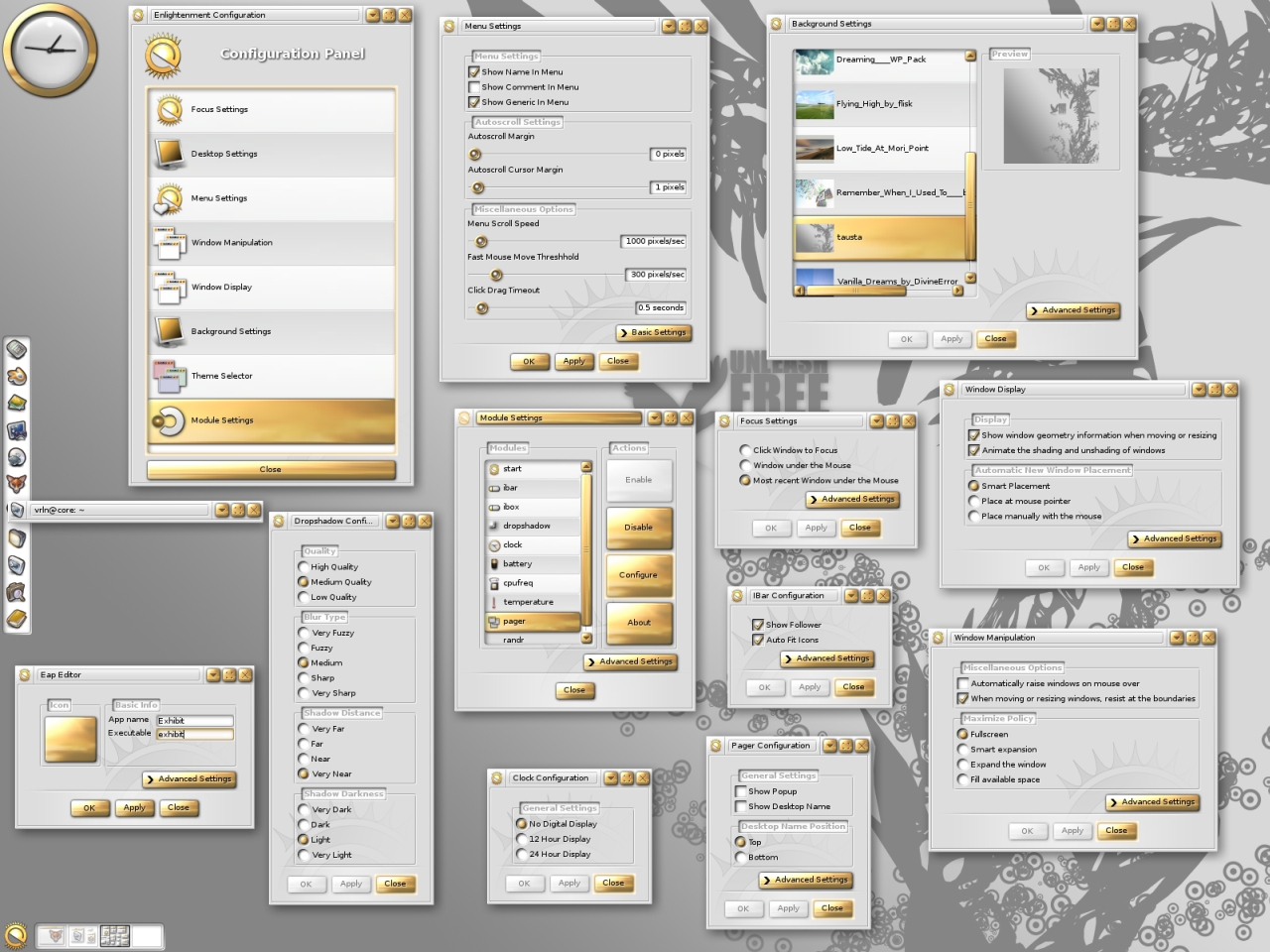|
OpenEmbedded
OpenEmbedded is a build automation framework and cross-compile environment used to create Linux distributions for embedded devices. The OpenEmbedded framework is developed by the OpenEmbedded community, which was formally established in 2003. OpenEmbedded is the recommended build system of the Yocto Project, which is a Linux Foundation workgroup that assists commercial companies in the development of Linux-based systems for embedded products. The build system is based on BitBake "recipes", which specify how a particular package is built but also include lists of dependencies and source code locations, as well as for instructions on how to install and remove a compiled package. OpenEmbedded tools use these recipes to fetch and patch source code, compile and link binaries, produce binary packages (ipk, deb, rpm), and create bootable images. Historically, OpenEmbedded's collection of recipes was stored in a single repository, and the metadata was structured in a form now called ... [...More Info...] [...Related Items...] OR: [Wikipedia] [Google] [Baidu] |
Yocto Project
The Yocto Project is a Linux Foundation collaborative open source project whose goal is to produce tools and processes that enable the creation of Linux distributions for embedded and IoT software that are independent of the underlying architecture of the embedded hardware. The project was announced by the Linux Foundation in 2010 and launched in March, 2011, in collaboration with 22 organizations, including OpenEmbedded. The Yocto Project's focus is on improving the software development process for embedded Linux distributions. The Yocto Project provides interoperable tools, metadata, and processes that enable the rapid, repeatable development of Linux-based embedded systems in which every aspect of the development process can be customized. In October 2018, Arm Holdings partnered with Intel in order to share code for embedded systems through the Yocto Project. Project scope The Yocto Project has the aim and objective of attempting to improve the lives of developers of cust ... [...More Info...] [...Related Items...] OR: [Wikipedia] [Google] [Baidu] |
BitBake
BitBake is a make-like build tool with the special focus of distributions and packages for embedded Linux cross compilation, although it is not limited to that. It is inspired by Portage, which is the package management system used by the Gentoo Linux distribution. BitBake existed for some time in the OpenEmbedded project until it was separated out into a standalone, maintained, distribution-independent tool. BitBake is co-maintained by the Yocto Project and the OpenEmbedded project. BitBake recipes specify how a particular package is built. Recipes consist of the source URL ,, ftp, cvs, svn, git, local file system) of the package, dependencies and compile or install options. They also store the metadata for the package in standard variables. During the build process, recipes are used to track dependencies, performing native or cross-compilation of the package and package it so that it is suitable for installation on the local or a target device. It is also possible to creat ... [...More Info...] [...Related Items...] OR: [Wikipedia] [Google] [Baidu] |
OpenZaurus
OpenZaurus is a defunct embedded operating system for the Sharp Zaurus personal mobile tool PDA. History In its original form, the project was a repackaging of the SharpROM, the Zaurus's factory supplied kernel and root filesystem image. In order to make the Zaurus's OS closer to the needs of the developer community, the SharpROM was altered through the use of bugfixes, software additions, and even removals in order to make the package more open. The OpenZaurus project was revamped completely, becoming Debian-based built from source, from the ground up. Due to the change in direction, OpenZaurus became quite similar to other embedded Debian-based distributions, such as Familiar for the iPAQ. OpenZaurus, in its current form, facilitates an easy method for users to build their own custom images. The efforts of Openzaurus, along with other embedded Linux projects, were integrated into the OpenEmbedded Project, which now provides the common framework for these projects. Varia ... [...More Info...] [...Related Items...] OR: [Wikipedia] [Google] [Baidu] |
Rpm (software)
RPM Package Manager (RPM) (originally Red Hat Package Manager, now a recursive acronym) is a free and open-source package management system. The name RPM refers to the file format and the package manager program itself. RPM was intended primarily for Linux distributions; the file format is the baseline package format of the Linux Standard Base. Although it was created for use in Red Hat Linux, RPM is now used in many Linux distributions such as PCLinuxOS, Fedora, AlmaLinux, CentOS, openSUSE, OpenMandriva and Oracle Linux. It has also been ported to some other operating systems, such as Novell NetWare (as of version 6.5 SP3), IBM's AIX (as of version 4), IBM i, and ArcaOS. An RPM package can contain an arbitrary set of files. Most RPM files are “binary RPMs” (or BRPMs) containing the compiled version of some software. There are also “source RPMs” (or SRPMs) containing the source code used to build a binary package. These have an appropriate tag in the file header that d ... [...More Info...] [...Related Items...] OR: [Wikipedia] [Google] [Baidu] |
GPE Palmtop Environment
GPE (a recursive acronym for GPE Palmtop Environment) is a graphical user interface environment for handheld computers, such as palmtops and personal digital assistants (PDAs), running some Linux kernel-based operating system. GPE is a complete environment of software components and applications which makes it possible to use a Linux handheld for tasks such as personal information management (PIM), audio playback, email, and web browsing. GPE is free and open-source software, subject to the terms of the GNU General Public License (GPL) or the GNU Lesser General Public License (LGPL). Supported devices GPE is bundled with embedded Linux distributions targeting the following platforms: * Sharp Zaurus * Hewlett-Packard iPAQ * Hewlett-Packard Jornada 72x * Siemens AG SIMpad SL4 In addition, GPE maintainers and the open source community are developing ports for additional devices: * GamePark Holdings GP2x * Nokia 770 * Nokia N800 * Palm TX * Palm Treo 650 * HTC Univ ... [...More Info...] [...Related Items...] OR: [Wikipedia] [Google] [Baidu] |
NSLU2
The NSLU2 (Network Storage Link for USB 2.0 Disk Drives) is a network-attached storage (NAS) device made by Linksys introduced in 2004 and discontinued in 2008. It makes USB flash memory and hard disks accessible over a network using the SMB protocol (also known as Windows file sharing or CIFS). It was superseded mainly by the NAS200 (enclosure type storage link) and in another sense by the WRT600N and WRT300N/350N which both combine a Wi-Fi router with a storage link. The device runs a modified version of Linux and by default, formats hard disks with the ext3 filesystem, but a firmware upgrade from Linksys adds the ability to use NTFS and FAT32 formatted drives with the device for better Windows compatibility. The device has a web interface from which the various advanced features can be configured, including user and group permissions and networking options. Hardware The device has two USB 2.0 ports for connecting hard disks and uses an ARM-compatible Intel XScale IXP420 ... [...More Info...] [...Related Items...] OR: [Wikipedia] [Google] [Baidu] |
Opkg
opkg (''open package management'') is a lightweight package management system based upon ipkg. It is written in C and resembles Advanced Package Tool (APT)/dpkg in operation. It is intended for use on embedded Linux devices and is used in this capacity in the OpenEmbedded and OpenWrt projects. Opkg was originally forked from ipkg by the Openmoko project. More recently, development of opkg has moved from its old Google Code repository to Yocto Project The Yocto Project is a Linux Foundation collaborative open source project whose goal is to produce tools and processes that enable the creation of Linux distributions for embedded and IoT software that are independent of the underlying architectu ... where it is actively maintained again. Opkg packages usually use either .ipk or .opk extension. References External links * Free package management systems Free software programmed in C Linux package management-related software Linux-only free software {{Linux-stu ... [...More Info...] [...Related Items...] OR: [Wikipedia] [Google] [Baidu] |
Linux
Linux ( or ) is a family of open-source Unix-like operating systems based on the Linux kernel, an operating system kernel first released on September 17, 1991, by Linus Torvalds. Linux is typically packaged as a Linux distribution, which includes the kernel and supporting system software and libraries, many of which are provided by the GNU Project. Many Linux distributions use the word "Linux" in their name, but the Free Software Foundation uses the name "GNU/Linux" to emphasize the importance of GNU software, causing some controversy. Popular Linux distributions include Debian, Fedora Linux, and Ubuntu, the latter of which itself consists of many different distributions and modifications, including Lubuntu and Xubuntu. Commercial distributions include Red Hat Enterprise Linux and SUSE Linux Enterprise. Desktop Linux distributions include a windowing system such as X11 or Wayland, and a desktop environment such as GNOME or KDE Plasma. Distributions intended for ... [...More Info...] [...Related Items...] OR: [Wikipedia] [Google] [Baidu] |
Efika
Efika is a line of power efficient ARM architecture and Power ISA based computers manufactured by Genesi. In Esperanto ''efika'' means "efficacious, effective, or efficient". EfikaPPC The EfikaPPC, sometimes also referred to as EFIKA 5200B, was based on a 400 MHz Freescale MPC5200B System-on-a-Chip and includes 44-pin 2.5" IDE, USB, serial port, stereo audio in/out, 100 Mbit/s Ethernet, 33/66 MHz PCI port and 128 MB DDR RAM. EFIKA uses an Open Firmware based CHRP compliant firmware with a special x86/BIOS emulator providing support for standard graphics cards on an AGP riser slot. The motherboard had a non-standard form factor, 118 mm × 153 mm × 38 mm small. Due to its small size, Restriction of Hazardous Substances Directive (RoHS) compliance and energy efficient nature (drawing less than 20 Watts with a harddrive and a graphics card, typically less than 10 Watts during most usage scenarios), the Efika was marketed as environmentally friendly. An Efika com ... [...More Info...] [...Related Items...] OR: [Wikipedia] [Google] [Baidu] |
Freescale Semiconductor
Freescale Semiconductor, Inc. was an American semiconductor manufacturer. It was created by the divestiture of the Semiconductor Products Sector of Motorola in 2004. Freescale focused their integrated circuit products on the automotive, embedded and communications markets. It was bought by a private investor group in 2006, and subsequently merged into NXP Semiconductors in 2015. History As of 2003, Motorola Semiconductor Products Sector earned US$5.0 billion in semiconductor sales in 2002 (out of US$27 billion sales for all of Motorola). Motorola announced that their semiconductor division would be divested on October 6, 2003, to create Freescale. Freescale completed its Initial public offering (IPO) on July 16, 2004, at a price of US$13. In its announcement, it estimated the stock price to be US$17.50- 19.50 but following a cooling of the market towards tech stocks, it lowered its price to US$13. Existing shareholders of Motorola stock received 0.110415 shares of Freescal ... [...More Info...] [...Related Items...] OR: [Wikipedia] [Google] [Baidu] |
Enlightenment (window Manager)
Enlightenment, also known simply as E, is a compositing window manager for the X Window System. Since version 20, Enlightenment is also a Wayland compositor. Enlightenment developers have referred to it as "the original eye-candy window manager." Enlightenment includes functions to provide a graphical shell and can be used in conjunction with programs written for GNOME or KDE. When used together with the Enlightenment Foundation Libraries (EFL), Enlightenment can refer to an entire desktop environment. History The first version of Enlightenment was released by Rasterman ( Carsten Haitzler) in 1997. Version 0.17, also referred to as E17, was in development for 12 years starting in December 2000 until 21 December 2012 when it was officially released as stable. During the development period it was also referred to as DR17 (Development Release 17). It is a complete rewrite on DR16 and was designed to be a full-fledged desktop shell, based on the new Enlightenment Foundation ... [...More Info...] [...Related Items...] OR: [Wikipedia] [Google] [Baidu] |

.jpg)

